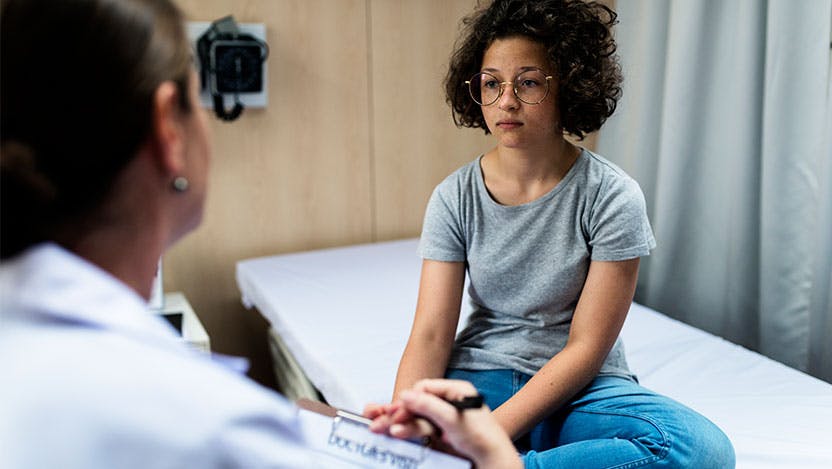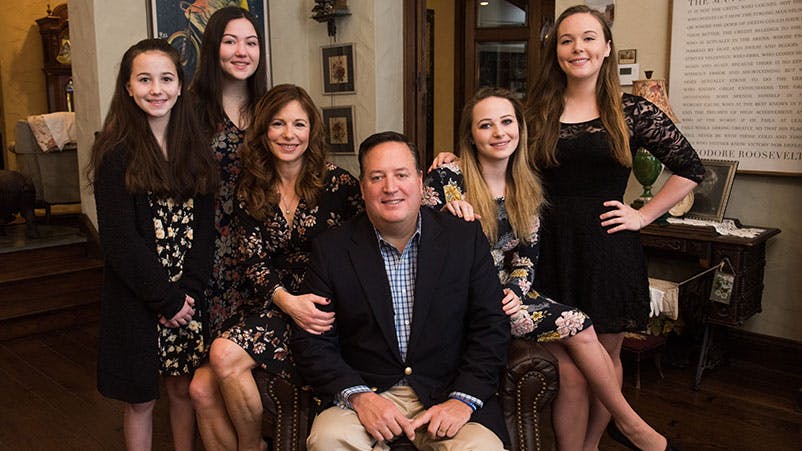Q&A with an expert on lupus in children

Lupus is a chronic autoimmune disease that occurs when the immune system attacks different parts of the body such as the skin, joints, blood cells and kidneys. It’s not uncommon for children to experience more severe lupus than adults, which is why the University of Chicago Medicine Comer Children’s Hospital Pediatric Lupus Clinic offers specialized care — one of the few dedicated centers in the country. Our multidisciplinary team of specialists aims to put each child’s lupus into remission and minimize flare-ups with the least medication possible.
Are some children more at risk for developing lupus?
Lupus can be diagnosed at any age, but it’s more common to be diagnosed as children start going through puberty, and it is far more common in females than males. Children from all ethnic backgrounds can develop lupus, but patients of color have a much higher prevalence.
How do I know if my child has lupus?
The hard part about lupus is that it presents very differently in everyone. I tell patients they have their own unique lupus fingerprint. No one's fingerprint is the same, just as no one's lupus is the same. Patients may present to medical care multiple times and no one recognizes their symptoms as lupus.
Unfortunately, there is no one test to diagnose lupus. Some patients present mildly with a rash and joint pain and their labs coincide with lupus. Other patients are very sick and come to the hospital with renal failure, seizures and are severely anemic or have blood clots. It can be difficult figuring out if someone has lupus or not, so it’s important to see skilled rheumatologists like the ones in our pediatric lupus clinic who understand lupus well.
Is a skin rash a sign my child has lupus?
Certain rashes are synonymous with lupus; one of them, a red rash across the cheeks and the nose, is called the butterfly or malar rash. Another common lupus rash is called discoid; it can be mistaken for ringworm or eczema. These rashes are often brought out by the sun. But lupus can exist without rashes, so you shouldn’t rely on them as an indicator.
What sorts of medications are used to treat lupus in children?
One of the mainstays of treatment is hydroxychloroquine. It's a safe medicine that has been used for decades and improves outcomes across the spectrum of the disease.
If a patient has more severe lupus or a flare-up, then steroids like prednisone are used. They can be life-saving medications, but we really try to avoid using excessive steroids in children because the side effects can be detrimental, such as delayed puberty, weight gain, acne, poor bone health and mood changes.
For mild to moderate lupus, we may use immunosuppressant medications like methotrexate, azathioprine or mycophenolate. We may also treat more severe lupus with cyclophosphamide or rituximab, two drugs that have traditionally been used for cancer. Belimumab was recently approved for use in children with lupus. The job of most of these medicines is to suppress the immune system, because with lupus, the immune system is overactive and attacking organs or tissues in the body. However, this means patients are also at risk for infections because these treatments make them immunosuppressed. Most children need more than one medication to treat their lupus.
What impact can lupus have on a child and their family?
Lupus can be very challenging, especially if the child had no health problems prior to their diagnosis. In the beginning, they may be on three or more medications, and ensuring patients and families understand the importance of taking those medications can be difficult. Side effects, fear or wanting to be "normal" like their friends are some reasons patients may not take their medications. Honestly, it can be hard to remember to take medications, no matter how old you are! Our clinic’s pharmacist is essential in helping families understand their medicines and treatment strategies.
What role does mental health play in the well-being of a child with lupus?
Anybody with a chronic illness is at increased risk for depression and anxiety, but in our patients, lupus itself and the medications we use can contribute to these diagnoses. Addressing our patients’ mental health is really important, and our clinic’s social worker and nurses help with this.
It’s important for a young person to understand that my goal is for them to live life to the fullest and do everything they want to do — but lupus is going to come along for the ride.
As children get older, are there specific challenges that can emerge with managing their lupus?
When a patient with lupus transitions from pediatric to adult care, it’s a fragile time. Studies show that without support, they’re unlikely to make it to their adult doctor appointments. That means they may run out of their medications and miss needed monitoring tests. This can lead to lupus flares, increasing emergency room visits, hospitalizations, and permanent organ damage. That’s why we usually care for patients until they’re 21 or 22 years old so we can help them safely transition to adult care.
Although I treat mostly children, I also treat adults with lupus, and patients do transition to me. It’s important for a young person to understand that my goal is for them to live life to the fullest and do everything they want to do — but lupus is going to come along for the ride.
Pediatric Rheumatology
The University of Chicago Medicine Comer Children's Hospital is a leader in the treatment of pediatric rheumatic conditions. Our multidisciplinary team of specialists aims to put each child’s lupus into remission and minimize flare-ups with the least medication possible.
Learn more about our pediatric rheumatology services
Cuoghi Edens, MD
Rheumatologist Cuoghi Edens, MD, provides care for children and adults with rheumatic diseases, including lupus, mixed connective tissue disease, juvenile idiopathic arthritis, psoriatic arthritis, vasculitis, dermatomyositis and other more rare conditions
Learn more about Dr. Edens
